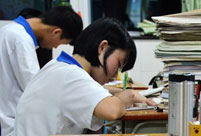 Luoyang aims to become 'Chinese Culture City'
Luoyang aims to become 'Chinese Culture City'
 Century-old jade disc found confirms ancient legend
Century-old jade disc found confirms ancient legend
 A serious mind behind Chinese leader
A serious mind behind Chinese leader
 Panda Cubs to Predict 2014 World Cup Winners
Panda Cubs to Predict 2014 World Cup Winners
 China Southern Airlines flight attendants win titles in service contest
China Southern Airlines flight attendants win titles in service contest
 Pupil's performance art persuades people to stop smoking
Pupil's performance art persuades people to stop smoking
 Nie Chenxi's clay tigers
Nie Chenxi's clay tigers
 Children's Day wishes
Children's Day wishes
 Chinese Kung Fu charms Silicon Valley
Chinese Kung Fu charms Silicon Valley
 Tranquil Yankou ancient town
Tranquil Yankou ancient town
Syrian President Bashar al-Assad says national dialogue will characterize his new term in office, according to his recent interview with the Lebanese al-Akhbar newspaper published Wednesday.
Dialogue is the main focus of the current phase, the president told the newspaper. "We have reconciled with the armed men and declared a pardon for them so how can we not dialogue with each other," he said.
According to the paper, Assad is now more convinced of Syrians' ability to overcome the three-year-old crisis.
The interview comes after the president won a third seven-year term in office in controversial presidential elections that the opposition and their Western-backers called a "sham." Assad is now trying to rebrand his image to the world by emphasizing that he is a political reformer.
"I have met people and delegations and have felt since the first moments of this crisis... that Syrians do trust the state and its president and army and that's why I keep betting on the people's ability to strike the roots of the conspiracy," Assad said, referring to the Syrian Foreign Ministry's position that says the armed uprising was foreign-inspired.
"The presidential elections came to emphasize that the people have not changed despite media campaigns, terrorism and foreign conspiring," he added.
Last week's presidential elections were the first multi- candidate poll in Syria's modern history. Assad won the vast majority of the vote, sweeping his little-known competitors, ex- minister Hassan Nouri and legislator Maher Hajjar.
On Monday, Assad declared a general amnesty, covering crimes committed before June 9. His pardon has been hailed by Syrian lawyers as "inclusive" that has only excluded "very few crimes."
During the interview, Assad also praised his main allies, Russia and Iran, while rejecting the idea that popular anger played a part in the uprising.
"President Vladimir Putin was and is still supporting the Syrian stance out of his conviction that what Syria has gone through wasn't a result of popular resentment, but the desire of foreign countries to destroy Syria's role. And while those countries violate international laws and human rights, Russian has repeatedly renewed its support," he said.
Despite the fact that ties between Iran and the West are growing warmer amid the nuclear negotiations, Assad still isn't worried that these developments will change Iran's support for his administration.
"Iran is not the one who will change toward Syria. It's steadfast in its position even more than anyone could know, but it 's America and the West who are the ones who have started sending the signals of a change (in their positions)," the president said, adding that it's their countries who have started to export " terrorism."
According to Assad, some former and current American officials are willing to reach out to the Syrian regime, although lobby groups are pressuring them not to, a sign that the world superpower is conflicted about the Syrian crisis.
But for all his emphasis on dialogue, the president showed little interest in talking to Syria's exiled opposition members, denouncing them as foreigners.
"What would holding dialogues with the exiled opposition benefit? Nothing! Simply, because they have nothing. They are unrelated to the people or the land. They have been sold illusions by Western and Arab countries and then they also sold illusions to the people but the current elections have come to strip them," he said.
"People have said their opinion and we must respect it," he added, saying the elections have changed Syria.
 Can't take eyes off national teams in World Cup
Can't take eyes off national teams in World Cup Graduation photos bring memories back to life
Graduation photos bring memories back to life Art school students present works in Nanjing
Art school students present works in Nanjing Xinjiang's first high-speed railway goes on trial run
Xinjiang's first high-speed railway goes on trial run 3D Sea-life Themed Art Garage unveiled in Zhengzhou
3D Sea-life Themed Art Garage unveiled in Zhengzhou
 Creative Photos go viral during graduation season
Creative Photos go viral during graduation season Students in last-minute effort for Gaokao
Students in last-minute effort for Gaokao Opening ceremony of 67th Cannes Film Festival
Opening ceremony of 67th Cannes Film Festival Pulse of Xiamen - Int'l Yoga art festival in May
Pulse of Xiamen - Int'l Yoga art festival in May Top 20 hottest women in the world in 2014
Top 20 hottest women in the world in 2014  Dali, an ideal summer vacation destination
Dali, an ideal summer vacation destination Xichan Temple's little monk hit the Internet
Xichan Temple's little monk hit the Internet Monologue of a modern dancer
Monologue of a modern dancer College girl proposes to boyfriend on Weibo
College girl proposes to boyfriend on Weibo Special operation members in counter-terrorism training
Special operation members in counter-terrorism trainingDay|Week|Month